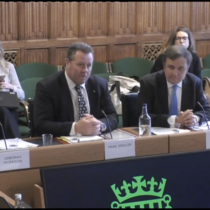Is eating less red meat really a win for our health and the planet?
The following article was written by Will Jackson, from AHDB It is reproduced here with their permission
The recent report produced by the Intergovernmental Panel on Climate Change (IPCC) on the impacts of global warming has reignited the crusade against eating meat, specifically on this occasion, beef. However, the real messaging of the report appears to have been twisted to suit the needs of headline writers and single-issue campaigners.
From Parliament to dinnertime chat at home, the perceived impact of livestock farming on the environment is the hot topic. The BBC’s interpretation of the report on August 6 fed the fire of anti-meat rhetoric, suggesting the report should lead viewers to question whether meat-free diets could be a long-term solution to climate change.
However, what the report actually stated was: “Balanced diets, featuring plant-based foods, such as those based on coarse grains, legumes, fruits and vegetables, nuts and seeds, and animal-sourced food produced in resilient, sustainable and low-GHG emission systems, present major opportunities for adaptation and mitigation while generating significant co-benefits in terms of human health.” Doesn’t sound very anti-meat does it? In fact, it backs the common sense notion that responsible livestock farming is part of the solution to climate issues, not the biggest offender.
Even as reporters tried to drive an anti-meat line in the press conference, experts from the panel repeatedly pushed back to say the analysis was not suggesting people turn away from meat – or any other food stuff. This did not stop the media creating their own story with the IPCC report as yet another nail in the coffin of eating meat.
Just a couple of days later, we had the announcement that Goldsmiths University of London has withdrawn beef from their menu on campus in a stance to tackle their own negative impact on the environment. This decision was, we are led to believe, partly steered by the messaging from the IPCC report.
Along with other industry bodies, AHDB has been supporting farmers to highlight a key fact missed in almost all reporting on emissions and livestock farming: meat and dairy production in the UK is among the most sustainable in the world. We have clear standards on animal welfare, increasingly, farms have right grass management systems in place, we have plenty of rain to make naturally occurring grass growing which grazing animals eat to create protein for humans with very few additional inputs needed. It is a natural cycle that also returns fertility to soils through manure.
AHDB continues to bang the drum and there are many others doing their bit also to balance the debate. AHDB Beef & Lamb board member James Evans was on BBC Midlands Today on August 13, explaining how his grassland helps to revitalise the soil and capture carbon.
There is a lack of understanding about British beef production and the distinction between it and production elsewhere in the world. With British livestock grazing in grass-based systems, the greenhouse gas (GHG) emissions are 2.5 times smaller than the global average. In fact, latest figures for the Committee on Climate change (CCC) acknowledge that emissions from farming amount to 9% of the national total, with 47% of that (so less than 4.5% total) from livestock digestion.
Combatting environmental degradation is without doubt in everyone’s interest. However, the UK is very different to other places on earth and, because of our natural environment and the weather, remains one of the most sustainable places in the world to produce red meat. In fact, without grazing cattle and sheep, as much as 60% of agricultural land in the UK would be taken out of food production, due to the fact it is not suitable for cropping or growing other produce. This would also significantly change the cherished landscapes we have in this country which livestock help to manage efficiently and naturally.
Another recommendation in the IPCC report around livestock is to have improved manure management systems in place and to research into genetic improvement of livestock. At AHDB we are proud to support our farmers with a number of campaigns to combat both of these issues including work to neutralise slurry and Signet Breeding Services which provides genetic evaluations to livestock producers to help them identify sheep and cattle with superior breeding potential.
In order to support the positive messaging and prevent well-intentioned individuals from being misled, AHDB has produced a range of soundbites and infographics which we have been sharing across social media, all of which are accessible for anyone to download directly from our website .
Amidst the slating of the beef industry for its environmental impact, there has also been a re-emergence of claims that red meat causes health problems, with headlines such as ‘Red meat raises risk of breast cancer in women’ and ‘Swap beef burgers for chicken cuts’. However, the evidence continues to support the position that red meat plays a vital role in a healthy, balance diet. To help push that message, we’ve put together a number of fact-based tools with the Meat Advisory Panel (MAP) which help highlight the positive health benefits of eating red meat. There is also a Podcast available to listen to about meat and health here.
So, the message when we are speaking to people about these challenges on welfare and red meat, is to look behind the headlines and seek out the facts. Plus, always remember, all foodstuffs have an environmental footprint of some kind and perhaps talk about the water demands of avocado farming or nut production for a change?
It should be all about balance.






